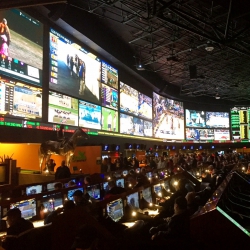American sports gamblers who’ve read about the U.S. Supreme Court’s decision to hear New Jersey’s sports betting case might assume the end of PASPA will lead to legal online sportsbooks.
States, including Mississippi and Connecticut, are preparing for the end of Protessional and Amateur Sports Protection Act of 1992, usually known as “PASPA”. Financial institutions ranging from Morgan Stanley to Motley Fool have predicted legal US sports betting within the next 5 years.
A wide range of sports insiders and experts — including Adam Silver, David Stern, Mark Cuban, and Rob Manfred — have predicted federal regulations for sports betting — and advocated for them.
Regulated online sportsbooks won’t happen in the United States anytime soon. Below are the reasons why.
1. Wire Act Violations
Legal brick-and-mortar sports betting only has to overcome the PASPA. If New Jersey’s case before the US Supreme Court succeeds, the justices will strike down the 46-state ban on sportsbooks inherent in the PASPA. It won’t strike down online sports betting bans, though.
The ban on online sportsbooks is based on the 1961 Wire Act and the 2006 Unlawful Internet Gambling Enforcement Act (UIGEA). The Wire Act made it illegal to wager over the telephone lines, a distinction to ban interstate gambling. The Wire Act was used by the US Justice Department to prosecute many organized crime figures over the decades.
The UIGEA made it illegal to engage in any form of gambling on the Internet that was banned under the 1961 Wire Act. People can debate whether online casinos and poker sites had antecedents in the Wire Act (and still do to this day), but there is no doubt the wire act banned sports betting. That means online sports betting is illegal under the UIGEA. Payment processors and software developers who help an online bookmaker site or sports betting exchange take bets from Americans will be targeted by the U.S. Department of Justice, whether PASPA is law or not.
UIGEA Would Have to Be Reversed
That means the UIGEA would have to be repealed before legal online sports betting became the law of the land. Since the fight by CSIG and several US congressmen (Charlie Dent, Lindsey Graham) is to pass Restore America’s Wire Act to ban online casinos and cardrooms, the chances that the online gambling industry goes on the offensive anytime soon is unlikely.
For that to happen, land-based gaming interests would need to support an end to the UIGEA. MGM Resorts and Caesars Entertainment support online gambling. Steve Wynn of Wynn Resorts is neutral, while Sheldon Adelson of Las Vegas Sands Corp is hostile to online gambling. Many tribal gaming interests oppose online poker, and they might oppose online sportsbooks. The possibility of a united front is next to zero, and here’s why.
2. Land-Based Sportsbooks Don’t Like iGaming
Brick-and-mortar gaming interests are not the same as online gaming interests. You might assume that brick-and-mortar sportsbooks would want to take their game online, so they could do business with a whole wide world of gamblers. There are several reasons why that’s a fallacy.
When you are the only casino for a hundred or two-hundred miles, you have a monopoly. When you have to compete against dozens or hundreds of online bookmakers, you have to beat the competition to sign up customers. Your betting lines have to be competitive, which hurt your margin. Your marketing has to be keyed to an ever-changing, technologically-evolving industry.
Casinos don’t like competition. They would rather restrict online gambling to restrict competition, then have you drive to them. That’s why brick-and-mortar casino companies often are the most hostile critics of online gambling.
3. Casino Operators Invested a Lot of Money
On a related note, land-based casino operators (where the biggest sportsbooks are found) spent hundreds of millions or even billions of dollars building their resorts. The casino companies who built those casinos, sportsbooks, and racebooks want visitors.
When they get you to their integrated casino-resort, you might play some poker, take in a few hands of blackjack or rolls of the craps dice, or even play the slots. You’ll eat expensive meals and rent a hotel room. If you have a spouse or family with you, you’ll visit some of the attractions or go to a few high-priced shows. Increasingly, integrated casinos means shopping in high-end retails chains and enjoying the nightlife in trendy bars and clubs.
These days, Las Vegas Strip casinos make 60% of their revenues from non-gaming attractions and 40% from gaming. If you make a sports bet from your computer screen at home, the big sportsbooks (most likely to lobby politicians) lose a lot of opportunities to generate revenue.
Reasons Legal Sportsbook Sites Might Happen
People who follow the online gaming industry might find reasons for optimism. Sports betting is more accepted today than it was a generation ago, because tens of millions of Americans engage in March Madness brackets and Super Bowl betting pools each year. Sports betting takes place every day on mobile smartphones. Daily fantasy sports seems like sports betting to many people, though DFS advocates claim their hobby is “gaming” and not “gambling”.
All these factors help make legal sports betting more likely in the near future. They do not make legal online sports betting in the United States more likely, though.

